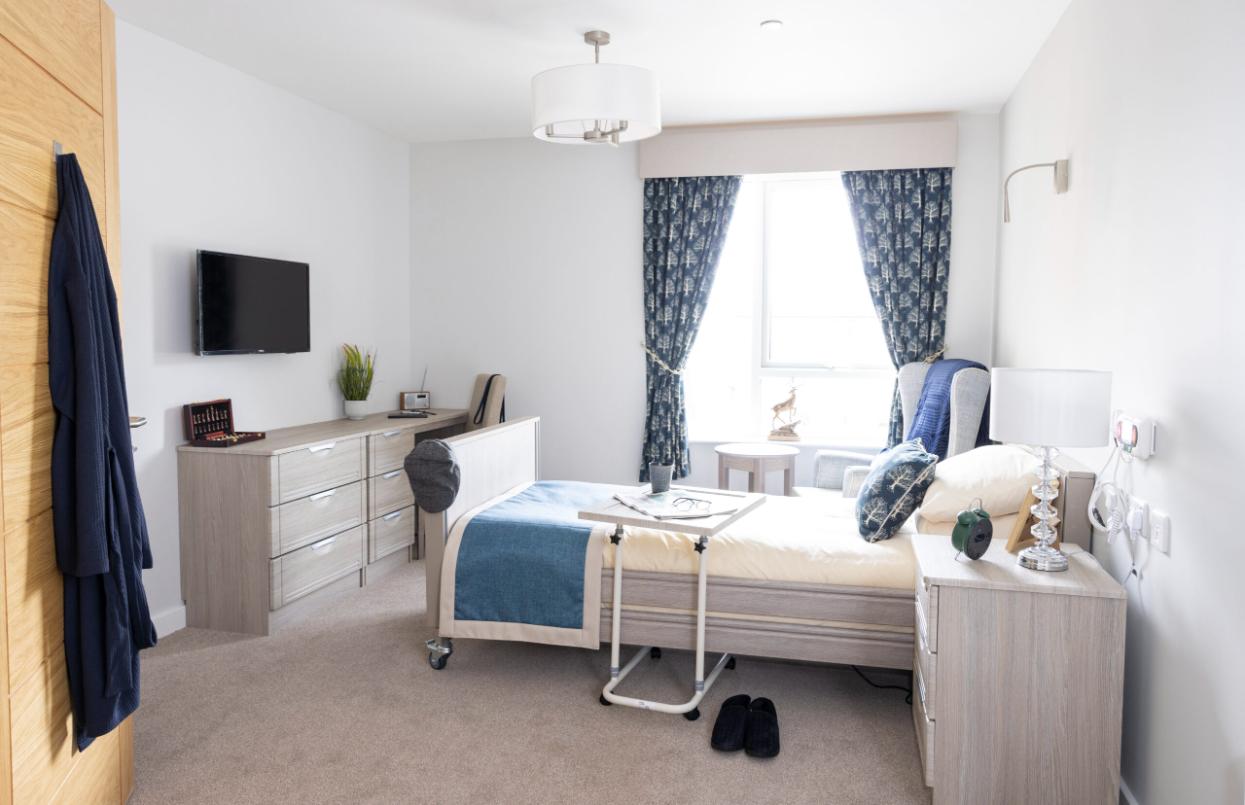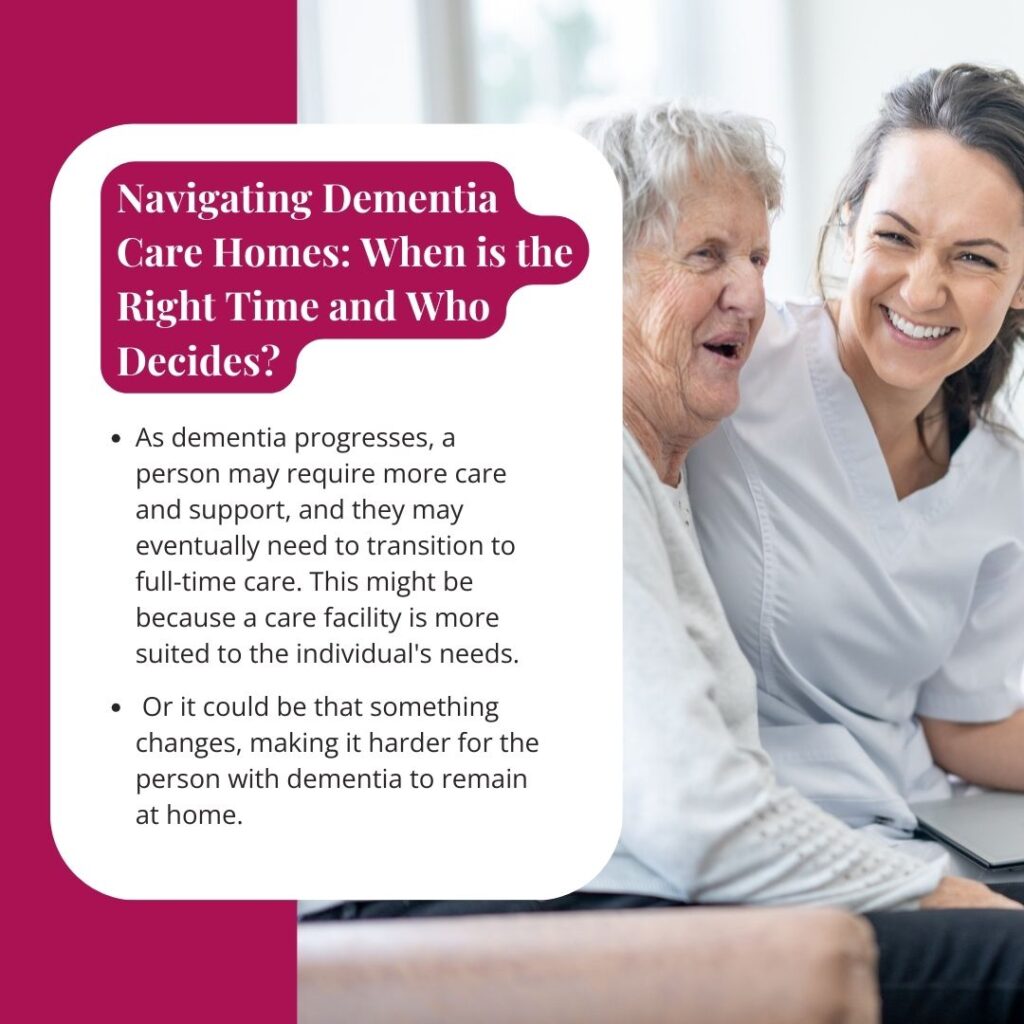When is the Right Time to Move into a Care Home?

Understanding the Need for a Care Home
Caring for someone with dementia can be emotionally and physically demanding, especially in the latter stages where someone's behaviour can become unsafe for themselves. Deciding to put a loved one in a care home is a difficult decision, and you may wonder what the right time is for someone with dementia to move into a care home.
The key points to remember are:
- Family members may need to consider a care home when they can no longer care for the person with dementia at home or when it’s in their best interests.
- A care home can provide a safe and supportive environment for people with dementia and memory problems.

Evaluating Mental Capacity and Decision-Making
The person with dementia should decide to go into residential or nursing care themselves, if possible. If dementia affects a person's safety and they find it increasingly difficult to take care of themselves, they will likely conclude on their own that they should move into a residential setting.
If they lack mental capacity, a family member or caregiver can decide their best interests. The decision should be made in the person’s best interests, considering their mental capacity and care needs. Generally speaking, the decision to move someone with late-stage dementia into a nursing home is a safer option than trying to care for them if you cannot give them the time they need.
A Lasting Power of Attorney (LPA) can be used to make decisions on behalf of the person with dementia.
What are the signs someone needs to go into a care home?
Look out for the following signs that someone is ready to move into a care home:
- They need round the clock care and you are unable to spend quality time with them to meet their care needs.
- Their personal hygiene is poor and they are unable to clean themselves to a suitable standard.
- A person is struggling to live independently and struggling with daily living tasks such as cooking and eating.
- They have raised a wish to move into a care home as their own decision.
Assessing Care Needs and Creating a Care Plan
A needs assessment can establish the person with dementia’s care needs and help you find out if a residential care home has the care staff and facilities in place to ensure all of their needs are met.
- A care plan should be created to outline the person’s care needs and how they will be met.
- The care plan should be regularly reviewed and updated to ensure it remains relevant.
Managing Property and Financial Affairs
Dementia patients may be eligible for financial assistance to move into a nursing home. A dementia progresses a person may need a high level of care and may even need more than one team member to help care for them. You may even need to look at specialist care homes.
- A Lasting Power of Attorney (LPA) can be used to make decisions about property and financial affairs.
- Family members may need to manage the person’s finance on their behalf if the person living with dementia can no longer make their own decisions.
- A financial assessment can determine whether the person qualifies for financial support with their care costs.
- The local authority may be able to provide financial support with care costs.
Finding the Right Care Home
Dementia care can involve specialist homes as someone with dementia may have complex health needs. Specialist care homes often have a main carer that has in-depth knowledge of how to support a person living with dementia.
Our tips:
- Request a needs assessment from a care home near you to determine the person’s care needs.
- Research and visit potential care homes to find the right one for the person with dementia.
- Consider the person’s individual needs and preferences when choosing a care home.
- Look for care homes that specialize in dementia care and have experience supporting people with dementia.
What Should I Look For To Ensure Personal Care and Support?
- A care home should provide personal care and support, such as washing, dressing, and eating.
- The care home should have a care plan in place to meet the person’s individual needs.
- The care home should have staff experienced in supporting people with dementia.
- The care home should provide a safe and supportive environment for the person with dementia.
- Group activities at nursing homes can foster a sense of belonging and socialisation in a safe environment.
- Ensure the home is able to spend time one on one with the person so that they receive the proper level of care.
Making the Transition to a Care Home
The transition to a care home can be difficult for the person with dementia and their family members.
The care home should provide support and guidance to make the transition as smooth as possible. The care home should have a clear admissions process and provide information about the care and support they offer. The care home should involve the person with dementia and their family in the decision-making process.
Ongoing Support and Review
The care home should provide ongoing support and review to ensure the person’s care needs are being met. The care home should have a system in place for reviewing and updating the care plan. We advise checking the care home can provide regular updates to you about the person’s care and well-being. The care home should be responsive to the person’s changing needs and preferences.
Someone with dementia may have different needs as they go through early stages to late stages of the condition. Check that there will be an updated care plan as someone's stay continues when deciding whether or not to move a dementia patient into care.
Deciding to transition a loved one into a care home is a difficult, but it can be the best option for their care and well-being. Family should be involved in the decision-making process and should consider the person’s best interests. A care home can provide a safe and supportive environment for people with dementia, and can offer specialist care and support. The care home should be chosen based on the person’s individual needs and preferences, and should provide ongoing support and review to ensure their care needs are being met.
Mearns View Dementia Care Home
At Mearns View Care Home in Newton Mearns, we offer premium dementia care, a varied lifestyle program, private gardens and more. As a luxury care home with a speciality in dementia care, we're a great option for those with dementia.
It's hard to leave your own home, but if you think you or someone with dementia may be safer and better cared for with support from a care home, then get in touch to find out more and see if it may be the right choice.





